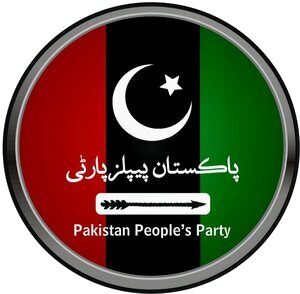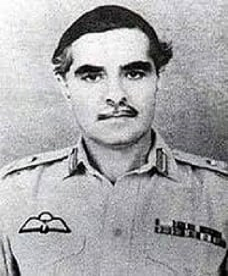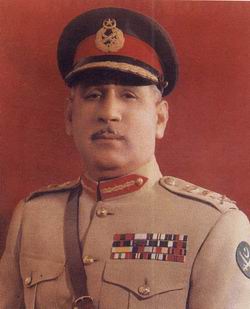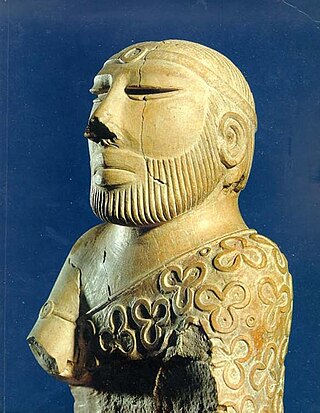
East Pakistan was the eastern provincial exclave of Pakistan between 1955 and 1971, covering the territory of the modern country Bangladesh. The province was restructured and renamed from East Bengal, which, in modern times, is split between India and Bangladesh. Its land borders were with India and Burma, with a coastline on the Bay of Bengal. East Pakistanis were popularly known as "Pakistani Bengalis"; to distinguish this region from India's state West Bengal, East Pakistan was known as "Pakistani Bengal". In 1971, East Pakistan became the newly independent state Bangladesh, which means "country of Bengal" or "country of Bengalis" in Bengali language.

Agha Muhammad Yahya Khan was a Pakistani military officer, who served as the third president of Pakistan from 1969 to 1971. He also served as the Commander-in-Chief of the Pakistan Army from 1966 to 1971. Along with Tikka Khan, he was considered the chief architect of the 1971 Bangladesh genocide.

Zulfikar Ali Bhutto was a Pakistani barrister, politician, and statesman. He served as the fourth president of Pakistan from 1971 to 1973 and later as the ninth prime minister of Pakistan from 1973 to 1977. Bhutto founded the Pakistan People's Party (PPP) and served as its chairman until his execution.

The Pakistan People's Party is a centre-left political party in Pakistan. It is currently the first-largest party in the Senate and third-largest party in the National Assembly. The party was founded in 1967 in Lahore, when a number of prominent left-wing politicians in the country joined hands against the military rule of president Muhammad Ayub Khan, under the leadership of Zulfikar Ali Bhutto. It is affiliated with the Socialist International. The PPP's platform was formerly socialist, and its stated priorities continue to include transforming Pakistan into a social-democratic state, promoting egalitarian values, establishing social justice, and maintaining a strong military. The party, alongside the Pakistan Muslim League-Nawaz and the Pakistan Tehreek-e-Insaf, is one of the three largest political parties of Pakistan.

Lieutenant General Gul Hassan Khan known secretly as George, was a three-star rank Pakistan Army general and diplomat who served as the 6th and last Commander-in-Chief of the Pakistan Army, serving from 20 December 1971 until 3 March 1972, the shortest tenure. Gul Hassan resigned along with Abdur Rahim Khan after they refused Zulfikar Ali Bhutto's request to use their forces to end a police strike protesting for a pay increase against Bhutto's government.

Tikka Khan was a Pakistani military officer who served as the first chief of the army staff from 1972 to 1976. Along with Yahya Khan, he is considered a chief architect of the 1971 Bangladesh genocide which according to independent researchers led to the deaths of 300,000 to 500,000 people.

The Rawalpindi conspiracy was an attempted coup to overthrow Liaquat Ali Khan, the first prime minister of Pakistan, in March 1951. It was the first of many subsequent coup attempts against governments in the history of Pakistan. The coup was notably planned by military general Akbar Khan, poet Faiz Ahmad Faiz and writer Sajjad Zaheer along with 12 others.

Khan Abdul Wali Khan was a Pakistani democratic socialist politician who served as president of Awami National Party. Son of the prominent Pashtun nationalist leader Abdul Ghaffar Khan, Wali Khan was an activist and a writer against the British Raj like his father.

Ghulam Murtaza Bhutto was a Pakistani politician and leader of al-Zulfiqar, a Pakistani left-wing militant organization. The son of Zulfikar Ali Bhutto, the former Prime Minister of Pakistan, he earned a bachelor's degree from Harvard University and a master's degree from the University of Oxford. Murtaza founded al-Zulfiqar after his father was overthrown and executed in 1979 by the military regime of General Zia-ul-Haq. In 1981, he claimed responsibility for the murder of conservative politician Chaudhry Zahoor Elahi, and the hijacking of a Pakistan International Airlines airplane from Karachi, during which a hostage was killed. In exile in Afghanistan, Murtaza was sentenced to death in absentia by a military tribunal.

The Wali Khan faction of the National Awami Party was formed after the 1967 split in the original NAP between Maulana Bhashani and Abdul Wali Khan. The Wali Khan faction was later named National Awami Party (NAP) after the independence of Bangladesh.
Meraj Muhammad Khan, was a well-known Pakistani socialist politician. He was noted as one of the key intellectuals and founding personalities of the Pakistan People's Party (PPP) and as a major contributor to the initial left of center/social democratic so-called Basic Programme of the Pakistan Tehreek-e-Insaf (PTI). He was also the founder of Qaumi Mahaz-i-Azadi which he founded after leaving the PPP in 1977.
Lieutenant General Ali Kuli Khan KhattakHI(M) is a retired Pakistani three-star rank general officer and former field commander of X Corps.
Sahibzada Ahmed Raza Khan Qasuri is a Pakistani politician and lawyer. He is the son of Nawab Muhammad Ahmed Khan Kasuri (1903–1974) who was assassinated in a car ambush in 1974.

General elections were held in Pakistan on 7 December 1970-17 January 1971 to elect members of the National Assembly. They were the first direct general elections since the independence of Pakistan and ultimately the only ones held prior to the independence of Bangladesh. Voting took place in 300 general constituencies, of which 162 were in East Pakistan and 138 in West Pakistan. A further thirteen seats were reserved for women, who were to be elected by members of the National Assembly.

Vice Admiral Syed Mohammad AhsanHQA, SPk, DSC, DMM, LOM often known as S. M. Ahsan, was a senior admiral of the Pakistan Navy who was the Commander in Chief of the Pakistan Navy, serving under President Ayub Khan from 1966 until 1969.

The Muslim League was the original successor of the All-India Muslim League that led the Pakistan Movement to achieve an independent nation. Five of the country's Prime Ministers have been affiliated with this party, namely Liaquat Ali Khan, Khwaja Nazimuddin, M. A. Bogra, Chaudhry Muhammad Ali, and I. I. Chundrigar. The Muslim League was defeated in the 1955 elections to the Constituent Assembly by a political alliance known as the United Front. However, Prime Minister C. M. Ali and Prime Minister Chundrigar were appointed to lead a minority government. The party was dissolved in 1958 after the declaration of Martial Law by General Muhammad Ayub Khan, the Commander-in-Chief of Pakistan Army.
The 1977 Pakistani military coup was the second military coup in Pakistan that took place on 5 July 1977. It was carried out by Muhammad Zia-ul-Haq, the chief of army staff, overthrowing the government of prime minister Zulfikar Ali Bhutto.

Military coups in Pakistan began in 1958 when military officer Muhammad Ayub Khan overthrew and exiled president Iskandar Ali Mirza. Since its creation in 1947, Pakistan has spent several decades under military rule. After their respective terms in office, each of the past five prime ministers of Pakistan has faced convictions or imprisonment. This trend highlights a significant aspect of Pakistan's political landscape: the prevailing rule that the Pakistani military exercises influence wherever it deems necessary, often persisting despite potential repercussions. Throughout Pakistani history, the military has played a prominent role in governance, with periods where it has directly ruled the country.
The influences of socialism and socialist movements in Pakistan have taken many different forms as a counterpart to political conservatism, from the groups like The Struggle, Lal Salam which is the Pakistani section of the International Marxist Tendency, to the Stalinist group like Communist Party through to the reformist electoral project enshrined in the birth of the Pakistan People's Party (PPP).
The non-cooperation movement of 1971 was a historical movement in then East Pakistan by the Awami League and the general public against the military government of Pakistan in March of that year. After the announcement of the suspension of the session of the National Assembly of Pakistan on 1 March, the spontaneous movement of the people started, but officially on the call of Sheikh Mujibur Rahman, the non-cooperation movement started on 2 March and continued until 25 March. The movement lasted for a total of 25 days.













